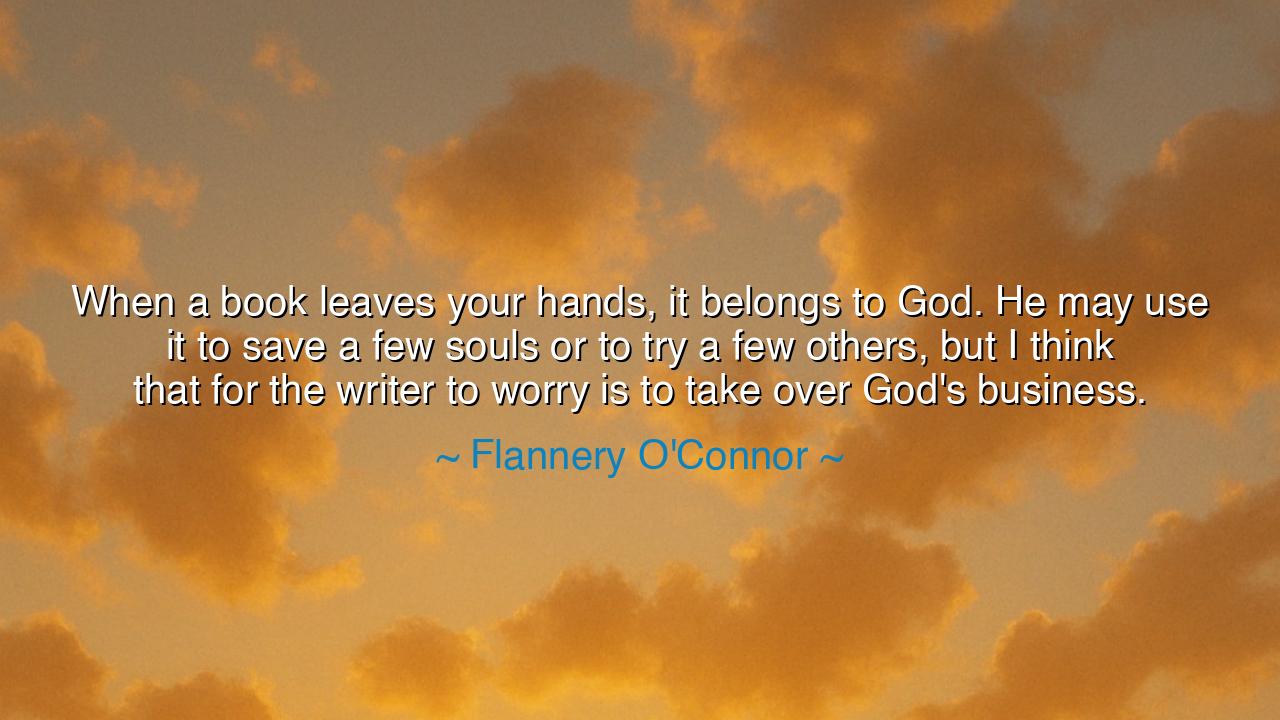
When a book leaves your hands, it belongs to God. He may use it
When a book leaves your hands, it belongs to God. He may use it to save a few souls or to try a few others, but I think that for the writer to worry is to take over God's business.






Host: The room was bathed in soft, golden light as the evening settled in. Jack sat on the couch, a book in his hands, his eyes scanning the page with a quiet focus. Jeeny, sitting across from him, noticed the thoughtful expression on his face and set her cup of tea down, sensing that something deep was on his mind.
Jeeny: (gently) “You seem lost in thought. What’s on your mind?”
Jack: (looking up slowly, his voice soft) “I was just reading something from Flannery O'Connor. She said, ‘When a book leaves your hands, it belongs to God. He may use it to save a few souls or to try a few others, but I think that for the writer to worry is to take over God’s business.’ It struck me how much trust O'Connor places in the act of writing. It’s as if she believes that once the book is out in the world, it’s no longer hers to control.”
Host: Jeeny’s expression softens, clearly moved by the depth of O'Connor’s words. The quiet in the room deepens as she reflects on what Jack said, clearly finding a deeper meaning in the quote.
Jeeny: “It’s so true, isn’t it? When you create something, whether it’s a book, art, or music, there’s a certain moment when you have to let go of it, to release it into the world. It stops being just yours. You can’t control how it’s received or how it affects others. And sometimes, the best thing you can do is trust that it will have the impact it’s meant to have, without you worrying about it.”
Jack: (nodding) “Exactly. O'Connor is saying that the writer’s job is to create, not to control the outcome. Once the work is out there, it’s like it becomes part of something bigger, something that can have its own life and purpose beyond what the writer intended. Whether it touches someone’s heart or challenges their beliefs, it’s all part of the process.”
Host: The room grows quieter as Jeeny thinks more deeply about the quote. Her gaze softens, and she looks out the window for a moment, reflecting on the concept of letting go and trusting in the larger purpose of one’s work.
Jeeny: “It’s almost like a reminder to have faith in your work. You do your best, pour your heart into it, and then you have to let go. The result isn’t for you to control. In some ways, it’s humbling, because you realize that you’re just a part of the process, and what happens with the work is ultimately up to something greater than you.”
Jack: “Yeah, it’s about trusting that the message, the story, or the art will find its way to the people who need it. Even if it doesn’t have the effect you expected, it might still be doing something important for someone else.”
Host: Jeeny smiles softly, her fingers curling around her cup as she considers the weight of the conversation. The room feels warmer now, as if the words have opened up a new perspective on creation and trust.
Jeeny: “It’s also a reminder that as creators, we don’t always have to see the impact of our work. It’s like planting a seed and trusting that it will grow in its own time, even if we don’t see it blossom right away.”
Jack: (grinning) “Exactly. We put something out into the world, and while we can’t control how it’s received, we can trust that it will do its part in ways we might not even see.”
Host: The conversation falls into a comfortable silence, the understanding settling between them that creation is an act of trust — trusting that once the work is out there, it’s no longer in our hands. Flannery O'Connor’s words remind us that letting go of our creations and trusting their impact is part of the beauty of art and life itself.






AAdministratorAdministrator
Welcome, honored guests. Please leave a comment, we will respond soon